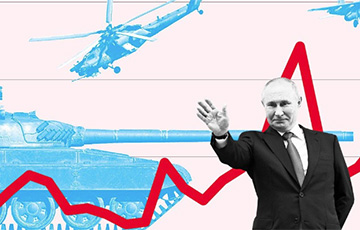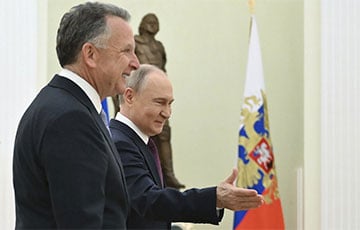Media: The Kremlin's Military Engine Has Stalled
5- 13.07.2025, 13:19
- 12,038

Moscow is getting nervous.
After forty months of war against Ukraine, Russia's economy is approaching a dangerous line. Growth rates are slowing down, prices are skyrocketing, and accumulated reserves are almost exhausted. Even the Kremlin is no longer hiding it: the former model of development, based on militarization and the sale of hydrocarbons, has exhausted itself. This is what EL PAÍS writes.
An anxious mood prevailed at this year's St. Petersburg International Economic Forum, once a showcase of Russia's might. Economic Development Minister Maksim Reshetnikov bluntly admitted: "We are on the brink of recession."
Central Bank Governor Elvira Nabiullina added that the resources that have supported the economy in recent years have all but run out. Experts from the Center for Macroeconomic Analysis warn of stagflation - a rare and dangerous condition when growth stops and inflation remains high.
Even after the first key rate cut in two and a half years - from 21% to 20% - the situation remains critical. According to official data, inflation in annual terms exceeds 10%, but independent institutions speak of a figure of over 15%.
While official statistics say that the unemployment rate in the country is just above 2%, and the average salary for the first time exceeded 100 thousand rubles, the real purchasing power of Russians is steadily declining. Over the same period, inflation amounted to 24%.
Deputy of the State Duma Nikolai Arefiev stated bluntly: "The authorities are hiding the real data on inflation. If we tell the truth, we will have to raise wages and pensions, and the state has no money for that."
The attempt to close 2025 with a budget deficit of 0.5% failed. The new estimate is 1.7%, the same as a year earlier. At the same time, there are less than 4 trillion rubles left in the National Welfare Fund, which is about as much as the budget deficit for the current year.
The financial situation of most citizens is worsening. According to the FOM center, only every tenth Russian believes that his life has improved, while every fifth says the opposite. Delayed wage payments have tripled, the number of Russians with overdue loans (less than 90 days) has passed 8.8 million people.
The problems in the economy do not only concern the pockets of Russians. The Stolypin Institute reports: 70% of companies in the first quarter recorded a drop in demand. There are fewer vacancies on the labor market, auto sales collapsed by 25%, and in the clothing sector sales fell by 30-35%.
Even massive subsidies to the military industry cannot compensate for the general decline. Military spending has remained the main driver of the Russian economy since 2022, on par with oil and gas exports.
But even this artificial growth is fading. According to estimates by Rosstat and the Higher School of Economics, the civilian sector has grown by just 1.9% over the past four years. This is very little.
The Kremlin's hopes for import substitution have also failed. The Russian economy is increasingly dependent on foreign supplies, especially from China.
According to economist Vladislav Inozemtsev, Russia has about one year of fiscal maneuvering left before severe spending cuts begin. If peace comes, the issue of salaries will become particularly acute: mobilized military personnel now earn more than 2,000 euros a month, four times the average wage.
The world risks a financial blow. Professor Maxim Mironov believes that the authorities may try to solve the problem through another devaluation of the ruble in order to replenish the budget at the expense of foreign currency earnings from exports. But this will lead to additional inflation, which is already undermining public confidence in the authorities.











